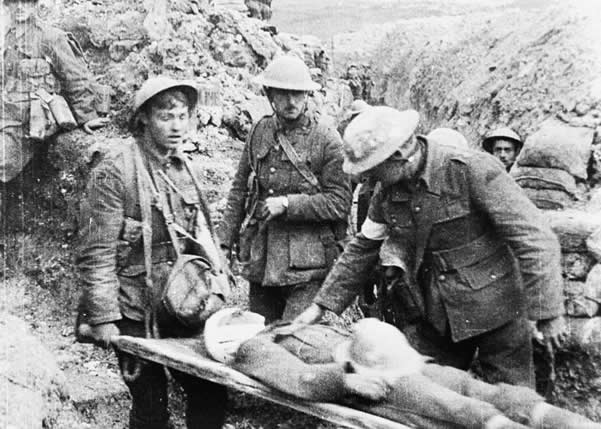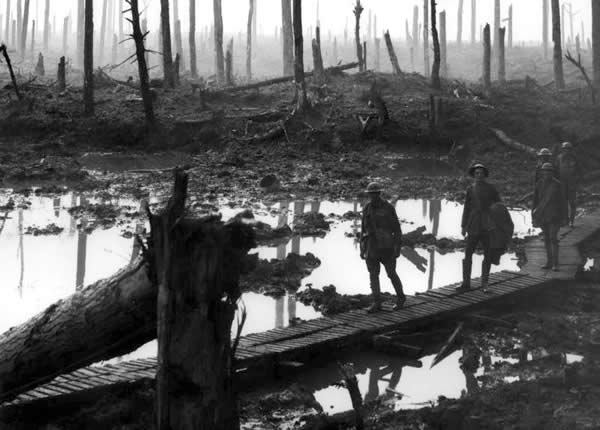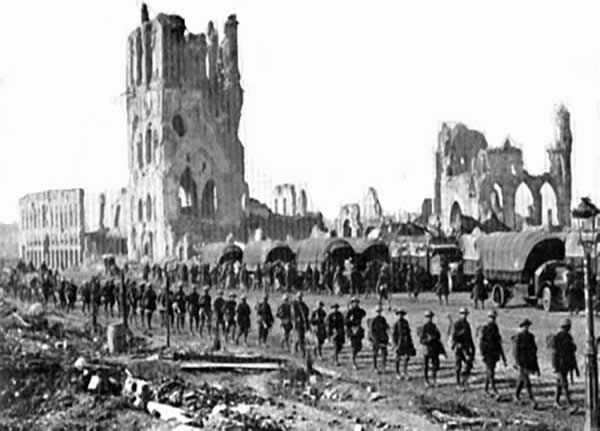Born 12th April 1891– Died 11th June 1916
Royal Field Artillery
Frank Mardle was born on the 12th April 1891, the youngest child of George Henry and Elizabeth (née Smart) Mardle of Cromer Hyde He was baptised at St. John's Lemsford on July 12th 1891, attended Lemsford school from 1894 to 1905 when he left to work on a farm. By 1911 he was working as a domestic gardener at Byrkley Gardens, Burton on Trent for Harmar Bass, the brewer.and living in a cottage with eight other under gardener.
Frank Mardle enlisted in London in 1914 and joined the Royal Field Artillery as Gunner 17691, By the time he was killed he had been promoted to Acting Bombardier.In a letter to his parents he wrote:- “We are in action again, same place, and we have had the most exciting time since we came out here. We relieved another battery last Tuesday week, and it was fairly quiet until last Friday . . . Fritz started shelling our trenches about nine o’clock last Friday morning and from then until almost midnight Sunday were at it night and day; in fact we have not had a decent sleep since, as we have had to replenish our ammunition store in readiness for another attack. We were firing so fast that ammunition had to be brought up in daylight, and Fritz was shelling the road heavily at the time. The shells fell all around us, but luckily nobody at the guns was hit. We had two direct on our pit, but we were so busy sending them over that we took no notice at the time. The guns got so hot that the paint peeled off the muzzle. The Germans got into our first line trenches, but suffered very heavy losses in doing so. . . Fritz paid very dearly for the little ground he gained, and we are still worrying him. I am expecting to be relieved for a rest this week-end, but would rather stay here if there is anything doing.” Acting Bombardier 17651R.F.A. was part of D Battery, 5th Brigade when he was killed on the 11th June 1916 aged 25 during the Third Battle of Ypres. He was in the battery when one of the shells burst in the muzzle of the gun he was laying and pieces flew back into the gun pit. One large piece went into the right side of his neck and he was killed instantaneously. He is buried in grave VI E 10 in the Railway Dugouts Burial Ground, Ieper, (Ypres) West-Vlaanderen, Belgium.
Attended St. Johns School July 2nd 1894 - 12th May 1905
| LEMSFORD WAR MEMORIAL 1914 - 1918 |
| TO THE GLORY OF GOD AND IN MEMORY OF THOSE WHO GAVE THEIR LIVES IN THE GREAT WAR |
Commonwealth War Graves
Lest We Forget
Acting Bombardier 17651R.F.A. was part of D Battery, 5th Brigade when he was killed on the 11th June 1916 aged 25 during the Third Battle of Ypres. He was in the battery when one of the shells burst in the muzzle of the gun he was laying and pieces flew back into the gun pit. One large piece went into the right side of his neck and he was killed instantaneously. He is buried in grave VI E 10 in the Railway Dugouts Burial Ground, Ieper, (Ypres) West-Vlaanderen, Belgium. Attended St. Johns School July 2nd 1894 - 12th May 1905
View MemorialLemsford local History Group WW1 Records
Memories & Letters
Memories from the people of Lemsford Parish – letters from the Front and home and much, much more
Local Parish Magazine
From the Bishop's Hatfield Parish Magazine 1914 to 1918, Church- Social - War Records
Servicemen of Lemsford
War records from 98 men who went to war. We show their memories images and why we should never forget them.
5 Facts the Great War
Battles of WW1

Battle of the Somme
1 July - 13 November 1916The British suffered around 420,000 casualties, the French 195,000 and the Germans around 650,000. Only in the sense of relieving the French at Verdun can the British have claimed any measure of success.

Battle of Passchendaele
31 July - 6 November 1917Passchendaele village lay barely five miles beyond the starting point of his offensive. Having prophesied a decisive success, it had taken over three months, 325,000 Allied and 260,000 German casualties

The First Battle of Ypres, 1914
October 19 to November 22, 1914First Battle of Ypres saw the BEF sustain 7,960 killed, 29,562 wounded, and 17,873 missing, while the French incurred between 50,000 and 85,000 casualties of all types. To the north, the Belgians took 21,562 casualties
